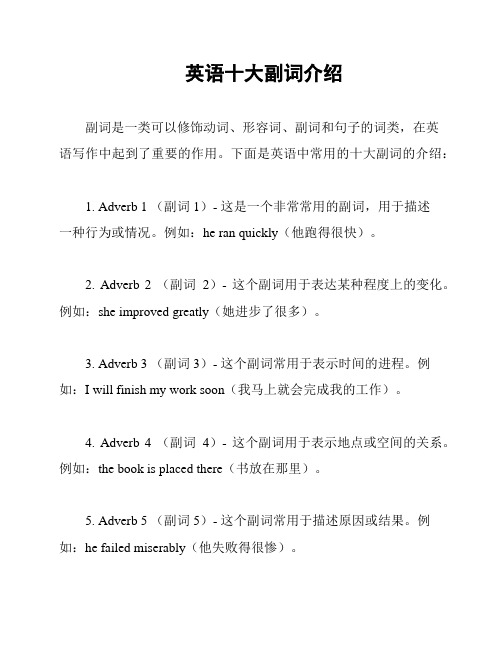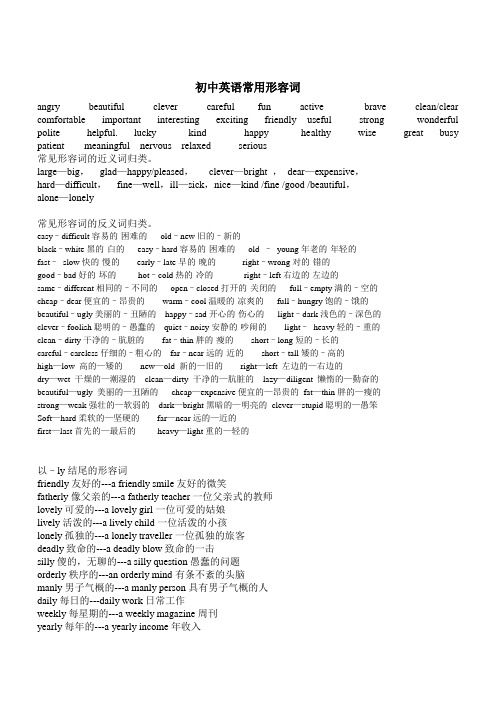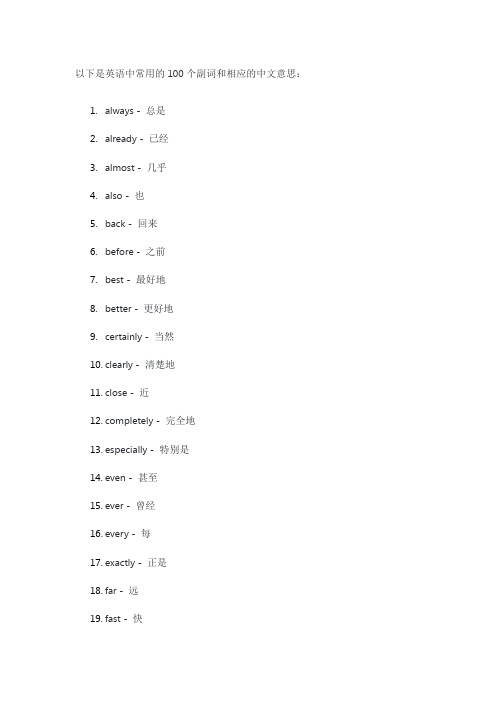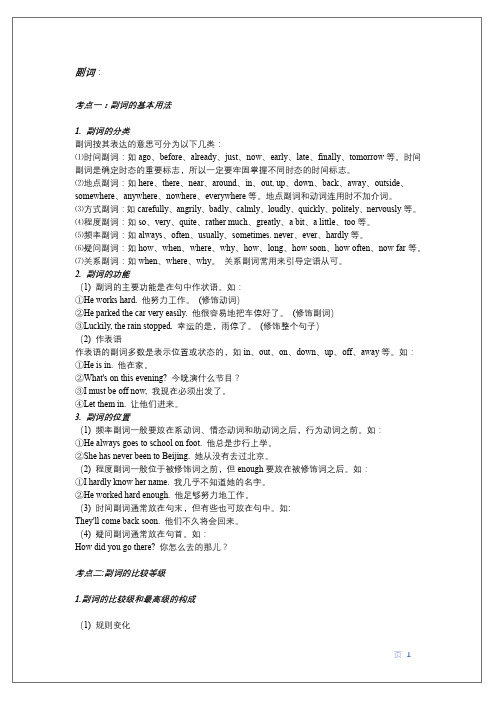英语常用50个副词
高中常用800英语副词

高中常用800英语副词1. 常用的位置副词1. here - 在这里here - 在这里2. there - 在那里there - 在那里3. everywhere - 到处everywhere - 到处4. somewhere - 某处somewhere - 某处5. nowhere - 无处nowhere - 无处6. upstairs - 楼上upstairs - 楼上7. downstairs - 楼下downstairs - 楼下8. inside - 里面inside - 里面9. outside - 外面outside - 外面10. nearby - 附近nearby - 附近2. 常用的时间副词1. now - 现在now - 现在2. then - 那时then - 那时3. always - 总是always - 总是4. never - 从不never - 从不5. often - 常常often - 常常6. usually - 通常usually - 通常7. sometimes - 有时候sometimes - 有时候8. rarely - 很少rarely - 很少9. soon - 不久soon - 不久10. later - 后来later - 后来3. 常用的方式副词1. quickly - 快速地quickly - 快速地2. slowly - 慢慢地slowly - 慢慢地3. loudly - 大声地loudly - 大声地4. quietly - 安静地quietly - 安静地5. carefully - 小心地carefully - 小心地6. easily - 容易地easily - 容易地7. hardly - 几乎不hardly - 几乎不8. happily - 快乐地happily - 快乐地9. sadly - 悲伤地sadly - 悲伤地10. angrily - 生气地angrily - 生气地4. 常用的程度副词1. very - 非常very - 非常2. extremely - 极其extremely - 极其3. quite - 相当quite - 相当4. too - 太too - 太5. somewhat - 有点somewhat - 有点6. almost - 几乎almost - 几乎7. nearly - 近乎nearly - 近乎8. just - 刚好just - 刚好9. barely - 几乎不barely - 几乎不以上是高中常用的800个英语副词,希望对你的研究有所帮助!> 注:这份文档中的内容只是常用副词的一部分,仅供参考。
30个副词英语

30个副词英语副词是一类在句子中修饰动词、形容词、副词、全句或者整个句子的词语。
它们可以提供更多的细节和信息,丰富句子的表达。
在英语中,副词扮演着重要角色,使得句子更加生动有力。
下面将为你介绍30个常用的英语副词。
1. Adoringly(崇拜地)- She looked at him adoringly, impressed by his talent.2. Angrily(生气地)- He shouted angrily at the referee after the game.3. Briskly(轻快地)- The dog walked briskly through the park, excited to be outside.4. Carefully(小心地)- She handled the fragile vase carefully, fearing it might break.5. Deliberately(故意地)- He deliberately ignored her, wanting to geta reaction.6. Eagerly(渴望地)- The children eagerly lined up for ice cream on a hot summer day.7. Frantically(疯狂地)- She searched frantically for her lost keys, turning the house upside down.8. Gently(温柔地)- The mother held her baby gently, rocking him to sleep.9. Happily(开心地)- They danced happily at the wedding, celebrating the couple's joy.10. Incessantly(不停地)- The rain fell incessantly throughout the night, keeping them awake.11. Joyfully(快乐地)- The children laughed joyfully as they played in the park.12. Luxuriously(奢侈地)- They enjoyed a luxuriously appointed hotel suite on their vacation.13. Mysteriously(神秘地)- The magician disappeared mysteriously behind the curtain, leaving the audience in awe.14. Nervously(紧张地)- He tapped his fingers nervously on the table, waiting for the interview to start.15. Optimistically(乐观地)- Despite the challenges, she approached the situation optimistically.16. Patiently(耐心地)- The teacher patiently explained the concept to the confused student.17. Quickly(快速地)- He ran quickly to catch the bus before it left.18. Reluctantly(勉强地)- She reluctantly accepted the invitation, knowing she had other commitments.19. Seriously(认真地)- He studied seriously for the exam, determined to achieve a high score.20. Tightly(紧紧地)- She hugged her friend tightly, not wanting to let go.21. Unbelievably(难以置信地)- The news of their engagement was unbelievably exciting.22. Vividly(生动地)- The author described the scene vividly, making readers feel like they were there.23. Wistfully(留恋地)- He looked wistfully at the old photo, reminiscing about the past.24. Yearningly(渴望地)- The athlete yearned yearningly for victory, training hard every day.25. Zealously(热情地)- She worked zealously on her project, determined to make it the best.26. Abruptly(突然地)- The phone rang abruptly, startling everyone in the room.27. Carelessly(粗心地)- She carelessly knocked over the glass, causing it to shatter.28. Honestly(诚实地)- He spoke honestly about his mistakes, wanting to make amends.29. Painfully(痛苦地)- The injured player walked painfully off the field, clutching his leg.30. Quietly(安静地)- They sat quietly in the library, studying for their exams.这些副词可以帮助你丰富句子的表达,使其更具感染力和准确性。
英语常用副词知识点总结

英语常用副词知识点总结1. Adverbs modify verbs: Adverbs often describe how an action is performed. For example, in the sentence "She ran quickly," the adverb "quickly" modifies the verb "ran" by describing how she ran.2. Adverbs modify adjectives: Adverbs can also modify adjectives to provide more information about the extent or degree of something. For example, in the sentence "She is very beautiful," the adverb "very" modifies the adjective "beautiful" by intensifying it.3. Adverbs modify other adverbs: Adverbs can also modify other adverbs to provide additional information. For example, in the sentence "He speaks incredibly fast," the adverb "incredibly" modifies the adverb "fast" by intensifying it.4. Adverbs of manner: Adverbs of manner describe how an action is performed. They often end in -ly, such as "quickly," "happily," "carefully," etc.5. Adverbs of place: Adverbs of place indicate where an action is performed. Examples include "here," "there," "everywhere," etc.6. Adverbs of time: Adverbs of time indicate when an action is performed. Examples include "now," "soon," "yesterday," "today," etc.7. Adverbs of frequency: Adverbs of frequency indicate how often an action is performed. Examples include "always," "never," "often," "rarely," etc.8. Adverbs of degree: Adverbs of degree indicate the extent or degree of an action. Examples include "very," "too," "so," "quite," etc.9. Position of adverbs: In most cases, adverbs are placed after the verb they modify. However, adverbs can also be placed at the beginning or end of a sentence, or before the main verb in a sentence.10. Comparative and superlative forms: Some adverbs have comparative and superlative forms to indicate degrees of comparison. For example, "quickly" becomes "more quickly" in the comparative form, and "most quickly" in the superlative form.11. Avoiding double negatives: It is important to avoid using double negatives with adverbs, as this can create confusion and ambiguity in a sentence. For example, "I don't want no trouble" should be corrected to "I don't want any trouble."12. Adverbs and adjectives: It is important to distinguish between adverbs and adjectives, as they have different functions in a sentence. Adjectives modify nouns, while adverbs modify verbs, adjectives, and other adverbs.13. Adverbs of manner and adjectives: Some adverbs of manner have the same form as adjectives, such as "fast." In these cases, it is important to pay attention to the context to determine whether it is functioning as an adverb or adjective.In conclusion, adverbs are an important part of speech in English that modify verbs, adjectives, and other adverbs to provide more information in a sentence. Understanding the different types of adverbs and how they function in a sentence is essential for clear and effective communication.。
英语十大副词介绍

英语十大副词介绍副词是一类可以修饰动词、形容词、副词和句子的词类,在英语写作中起到了重要的作用。
下面是英语中常用的十大副词的介绍:1. Adverb 1 (副词1)- 这是一个非常常用的副词,用于描述一种行为或情况。
例如:he ran quickly(他跑得很快)。
2. Adverb 2 (副词2)- 这个副词用于表达某种程度上的变化。
例如:she improved greatly(她进步了很多)。
3. Adverb 3 (副词3)- 这个副词常用于表示时间的进程。
例如:I will finish my work soon(我马上就会完成我的工作)。
4. Adverb 4 (副词4)- 这个副词用于表示地点或空间的关系。
例如:the book is placed there(书放在那里)。
5. Adverb 5 (副词5)- 这个副词常用于描述原因或结果。
例如:he failed miserably(他失败得很惨)。
6. Adverb 6 (副词6)- 这个副词用于表示方式或方式。
例如:she sings beautifully(她唱得很好听)。
7. Adverb 7 (副词7)- 这个副词常用于描述程度或数量。
例如:he ate too much(他吃得太多了)。
8. Adverb 8 (副词8)- 这个副词用于表示感情或态度。
例如:she smiled happily(她开心地微笑)。
9. Adverb 9 (副词9)- 这个副词常用于表示目的或目标。
例如:he went there to learn(他去那里研究)。
10. Adverb 10 (副词10)- 这个副词用于表示顺序或步骤。
例如:first, he did this; then, he did that(他首先做了这个,然后又做了那个)。
以上是十大常用的英语副词介绍,希望对您的学习有所帮助。
记住在写作中灵活使用副词,能够让句子更加准确有力。
初中英语常用形容词 副词

初中英语常用形容词angry beautiful clever careful fun active brave clean/clear comfortable important interesting exciting friendly useful strong wonderful polite helpful. lucky kind happy healthy wise great busy patient meaningful nervous relaxed serious常见形容词的近义词归类。
large—big,glad—happy/pleased,clever—bright ,dear—expensive,hard—difficult,fine—well,ill—sick,nice—kind /fine /good /beautiful,alone—lonely常见形容词的反义词归类。
easy–difficult容易的-困难的old–new旧的–新的black–white黑的-白的easy–hard容易的-困难的old –young年老的-年轻的fast–slow快的-慢的early–late早的-晚的right–wrong对的-错的good–bad好的-坏的hot–cold热的-冷的right–left右边的-左边的same–different相同的–不同的open–closed打开的-关闭的full–empty满的–空的cheap–dear便宜的–昂贵的warm–cool温暖的-凉爽的full–hungry饱的–饿的beautiful–ugly美丽的–丑陋的happy–sad开心的-伤心的light–dark浅色的–深色的clever–foolish聪明的–愚蠢的quiet–noisy安静的-吵闹的light–heavy轻的–重的clean–dirty干净的–肮脏的fat–thin胖的-瘦的short–long短的–长的careful–careless仔细的–粗心的far–near远的-近的short–tall矮的–高的high—low 高的—矮的new—old 新的—旧的right—left 左边的—右边的dry—wet 干燥的—潮湿的clean—dirty 干净的—肮脏的lazy—diligent 懒惰的—勤奋的beautiful—ugly 美丽的—丑陋的cheap—expensive便宜的—昂贵的fat—thin胖的—瘦的strong—weak强壮的—软弱的dark—bright黑暗的—明亮的clever—stupid聪明的—愚笨Soft—hard柔软的—坚硬的far—near远的—近的first—last首先的—最后的heavy—light重的—轻的以–ly结尾的形容词friendly友好的---a friendly smile友好的微笑fatherly像父亲的---a fatherly teacher一位父亲式的教师lovely可爱的---a lovely girl一位可爱的姑娘lively活泼的---a lively child一位活泼的小孩lonely孤独的---a lonely traveller一位孤独的旅客deadly致命的---a deadly blow致命的一击silly傻的,无聊的---a silly question愚蠢的问题orderly秩序的---an orderly mind有条不紊的头脑manly男子气概的---a manly person具有男子气概的人daily每日的---daily work日常工作weekly每星期的---a weekly magazine周刊yearly每年的---a yearly income年收入副词的分类副词按词汇意义可分为:方式副词:well,fast,slowly,carefully,quickly程度副词:very,much,enough,almost,rather,quite地点副词:here,there,out,somewhere,abroad,home哪些单词既是形容词又是副词初中常见的有:fast, hard, enough, early, late,t,high,far方式副词:well(好地) fast(快地) carefully(小心地) quickly(快地)sadly(伤心地)badly(严重地,非常)slowly(慢慢地)politely(有礼貌地)proudly(骄傲地),carelessly(粗心地)properly(适当地,完全地)successfully(成功地)happily(高兴地)angrily(生气地,愤怒地)。
英语常用100个副词带中文

以下是英语中常用的100个副词和相应的中文意思:1.always - 总是2.already - 已经3.almost - 几乎4.also - 也5.back - 回来6.before - 之前7.best - 最好地8.better - 更好地9.certainly - 当然10.clearly - 清楚地11.close - 近pletely - 完全地13.especially - 特别是14.even - 甚至15.ever - 曾经16.every - 每17.exactly - 正是18.far - 远19.fast - 快20.finally - 最终21.first - 首先22.forever - 永远23.forward - 往前24.further - 更进一步25.generally - 一般地26.greatly - 大大地27.hard - 努力地28.here - 这里29.higher - 更高地30.however - 然而31.immediately - 立即32.just - 只是tely - 最近ter - 以后35.least - 最少36.less - 更少37.likely - 可能38.little - 一点39.long - 长41.maybe - 也许42.meanwhile - 同时43.more - 更多44.mostly - 大多45.nearly - 近乎46.never - 从不47.now - 现在48.often - 经常49.only - 仅仅50.openly - 公开地51.positively - 积极地52.possibly - 可能地53.quickly - 快速地54.quite - 非常55.rather - 相当56.really - 真正地57.recently - 最近58.right - 对59.seriously - 认真地61.since - 自从62.so - 这么63.soon - 不久64.still - 仍然65.straight - 直66.suddenly - 突然67.sure - 肯定68.thoroughly - 彻底地69.today - 今天70.tomorrow - 明天71.too - 太72.totally - 完全地73.truly - 真正地74.typically - 典型地75.ultimately - 最终ually - 通常77.very - 非常78.well - 好79.whatever - 不管什么80.whenever - 每当81.wherever - 无论何处82.wholly - 完全地83.widely - 广泛地84.yet - 尚未85.yesterday - 昨天86.always - 总是87.ever - 曾经88.never - 从不89.sometimes - 有时90.often - 经常91.seldom - 很少ually - 通常93.occasionally - 偶尔94.generally - 一般来说95.regularly - 定期地96.frequently - 经常地97.rarely - 很少地98.occasionally - 偶尔地99.repeatedly - 再三100.hardly - 几乎不。
初中英语语法---副词

副词:考点一:副词的基本用法1. 副词的分类副词按其表达的意思可分为以下几类:⑴时间副词:如ago、before、already、just、now、early、late、finally、tomorrow等。
时间副词是确定时态的重要标志,所以一定要牢固掌握不同时态的时间标志。
⑵地点副词:如here、there、near、around、in、out, up、down、back、away、outside、somewhere、anywhere、nowhere、everywhere等。
地点副词和动词连用时不加介词。
⑶方式副词:如carefully、angrily、badly、calmly、loudly、quickly、politely、nervously等。
⑷程度副词:如so、very、quite、rather much、greatly、a bit、a little、too等。
⑸频率副词:如always、often、usually、sometimes. never、ever、hardly等。
⑹疑问副词:如how、when、where、why、how、long、how soon、how often、now far等。
⑺关系副词:如when、where、why。
关系副词常用来引导定语从可。
2. 副词的功能(1) 副词的主要功能是在句中作状语。
如:①He works hard. 他努力工作。
(修饰动词)②He parked the car very easily. 他很容易地把车停好了。
(修饰副词)③Luckily, the rain stopped. 幸运的是,雨停了。
(修饰整个句子)(2) 作表语作表语的副词多数是表示位置或状态的,如in、out、on、down、up、off、away等。
如:①He is in. 他在家。
②What's on this evening? 今晚演什么节目?③I must be off now, 我现在必须出发了。
英语小作文常用副词大全

英语小作文常用副词大全Sure, here's a comprehensive list of commonly used adverbs in English writing:1. Actually: Actually, I quite like the idea.2. Additionally: Additionally, we can consider other options.3. Alternatively: Alternatively, we could try adifferent approach.4. Basically: Basically, it's a simple concept to grasp.5. Certainly: Certainly, I will attend the meeting.6. Clearly: Clearly, there are some issues we need to address.7. Consequently: Consequently, we had to revise our8. Definitely: Definitely, we should proceed with caution.9. Evidently: Evidently, there has been a misunderstanding.10. Eventually: Eventually, we reached a consensus.11. Exactly: Exactly, that's what I was thinking.12. Fortunately: Fortunately, the problem was resolved quickly.13. Generally: Generally, people tend to agree on this point.14. Hopefully: Hopefully, things will improve in the future.15. However: However, there are some exceptions to the16. Indeed: Indeed, it is a remarkable achievement.17. Interestingly: Interestingly, the results varied significantly.18. Likewise: Likewise, we can apply the same principle here.19. Moreover: Moreover, there are other factors to consider.20. Naturally: Naturally, there will be some resistance to change.21. Obviously: Obviously, this situation requires immediate attention.22. Particularly: Particularly, I enjoyed the last section of the book.23. Possibly: Possibly, we could explore alternative solutions.24. Precisely: Precisely, that's the point I was trying to make.25. Presumably: Presumably, they will arrive shortly.26. Primarily: Primarily, the focus should be on customer satisfaction.27. Probably: Probably, it's best to wait for further instructions.28. Promptly: Promptly, he responded to my email.29. Quite: Quite frankly, I'm not sure about that.30. Really: Really, I can't thank you enough for your help.31. Recently: Recently, there have been some changes tothe policy.32. Similarly: Similarly, we need to consider all options.33. Simply: Simply put, we need more time to completethe project.34. Sincerely: Sincerely, I apologize for any inconvenience caused.35. Subsequently: Subsequently, we witnessed a declinein sales.36. Suddenly: Suddenly, there was a loud noise from outside.37. Surely: Surely, there must be a better solution.38. Therefore: Therefore, we must take immediate action.39. Ultimately: Ultimately, the decision lies with theboard of directors.40. Usually: Usually, meetings are held on Monday mornings.These adverbs can add depth and clarity to your writing, helping to convey your thoughts and ideas more effectively.。
